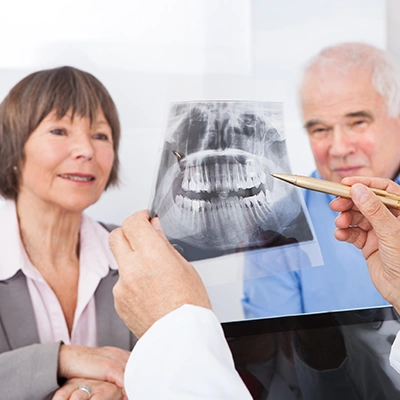Dental implants are a highly effective solution for replacing missing teeth, offering both aesthetic and functional benefits. However, the healing process following dental implant surgery can be crucial and requires careful attention and proper care. If you’re wondering, “How can I make my dental implants heal faster?” you’re not alone.
Many patients seek ways to speed up their recovery and ensure the best possible outcomes. We are here to give you all the top tips on accelerating your healing process and enjoying your new smile sooner. From immediate post-surgery care to long-term maintenance, we’ll cover everything you need to know to make your dental implants heal faster and more efficiently.
Understanding the Dental Implant Healing Process
The dental implant healing process involves several stages, each critical to the successful integration of the implant with your jawbone.
Unfortunately, dental implant surgery often results in significant discomfort in the days following the procedure, with minor bruising and swelling of the mouth and face being common. Recovery times vary for each patient; some may need only a few days if there are no complications. However, recovery may take longer if a bone graft is necessary due to an insufficiently strong jawbone to support the implant.
Osseointegration, the process where the implant fuses with the bone, typically takes about 3-6 months. Although this duration might seem daunting, recovery after dental implant surgery is generally easier than many people expect.

Factors that Influence Healing After Dental Implants
Before understanding “How can I make my dental implants heal faster?,” you need to know the factors that influence healing after a dental implant surgery.
- Overall Health: General health conditions such as diabetes, autoimmune diseases, and chronic illnesses can slow down the healing process. Healthy individuals tend to recover more quickly.
- Oral Hygiene: Maintaining excellent oral hygiene is crucial. Proper brushing, flossing, and using an antimicrobial mouthwash can prevent infections and promote faster healing.
- Smoking & Alcohol Use: Smoking and excessive alcohol consumption can impair blood flow and reduce the body’s ability to heal. Avoiding these can significantly improve healing outcomes.
- Diet & Nutrition: A balanced diet rich in vitamins and minerals supports the healing process. Adequate hydration and nutrient intake are essential for tissue repair and overall recovery.
- Age:H3 Younger patients often heal faster than older individuals, as the regenerative capacity of tissues generally diminishes with age.
- Bone Quality & Density: The quality and density of the jawbone affect how well the implant integrates. Stronger, denser bone usually leads to quicker osseointegration.
- Surgical Technique: The skill and experience of the surgeon, as well as the technique used, can influence the extent of trauma to the tissues and the overall healing time.
- Post-Surgical Care: Following the dentist’s post-operative care instructions meticulously, including taking prescribed medications and attending follow-up appointments, is critical for optimal healing.
- Pre-Existing Dental Conditions: Conditions such as gum disease or previous infections in the mouth can complicate the healing process and should be managed prior to implant surgery.
How Can I Make My Dental Implants Heal Faster?
Rest
Rest is essential for aiding your body’s healing process. Feeling tired or run down is your body’s signal to slow down, especially while recovering from dental implant surgery. Overexerting yourself can prolong recovery.
This is particularly important in the initial days post-surgery. Refrain from strenuous activities and anything that risks facial impact, as these can increase the likelihood of post-operative complications.
Stay Hydrated
Hydration is crucial, particularly after dental implant surgery. Staying hydrated helps flush out toxins that could hinder recovery and keeps you energized. Drink plenty of water and avoid dehydrating beverages like coffee and alcohol.
Alcohol can impede the healing process and should be avoided for at least two weeks post-surgery, ideally until full recovery. Also, avoid using straws, as the suction can irritate the surgical site.
Use Ice Packs
While swelling after dental implant surgery is usually minimal, using ice packs can help reduce any swelling and alleviate pain. Wrap the ice pack in a towel to protect your skin and apply it to your face for 20 minutes at a time, taking 20-minute breaks in between. Avoid leaving ice packs on for too long to prevent ice burns.
Rinse with Salt Water
Saltwater rinses are recommended after oral surgery to soothe the area and reduce bacteria in the mouth. Mix 1 teaspoon of salt in 8 oz of warm water, swish it around in your mouth for 30 seconds, then spit it out. Depending on your dentist’s advice, you can rinse up to four times daily.
Eat Soft & Nutritious Foods
After dental implant surgery, avoid hot or spicy foods for the first 48 hours, as they can cause bleeding or irritation. Stick to soft foods that require minimal chewing to avoid disturbing the surgical site.
Nutrient-rich foods are vital for faster healing and reducing complications. Steam vegetables like broccoli for a soft, nutrient-dense option, and consider smoothies and protein drinks—using a spoon instead of a straw to avoid irritation.
Practice Good Oral Hygiene
Maintaining good oral hygiene is also important, even though dental implants are not natural teeth. Your oral hygiene routine may need adjustments during recovery, but following your dentist’s instructions is essential to keep your mouth clean and reduce the risk of infection.
Avoid Smoking
Smoking is detrimental to both dental and overall health and can significantly hinder recovery after dental implant surgery. Nicotine reduces oxygen supply to your bones and oral tissues, slowing the healing process.
Additionally, smoking negatively impacts osseointegration, increasing the risk of implant failure. Quitting or refraining from smoking during recovery is strongly advised.
Take Pain Medications as Advised
Your dental surgeon will likely prescribe pain medications. Use them as directed to manage pain effectively and minimize discomfort.
Schedule a Follow-Up Appointment
Your implant provider will likely want to see you about three weeks after the procedure. This follow-up is crucial for evaluating the implant’s healing torque if it is placed in a two-stage process or for proceeding with the second part of the operation to insert the healing abutment.
Recognizing Abnormal Symptoms After a Dental Implant Surgery
- Severe Pain: Intense or worsening pain that is not relieved by medications could indicate an issue and should be addressed by your dentist.
- Excessive Bleeding: Persistent or heavy bleeding that doesn’t reduce with pressure or gauze needs immediate attention.
- High Fever: A high fever or persistent fever may suggest an infection and require prompt medical evaluation.
- Persistent Swelling or Redness: Swelling or redness that worsens over time rather than improving could be a sign of infection.
- Unpleasant Taste or Discharge: A foul taste or discharge from the surgical site might indicate an infection or other complication.
- Loose Implant: If the implant feels loose or moves, contact your dentist immediately, as this could indicate a failure to integrate with the bone.
Conclusion
Achieving a swift and smooth recovery after dental implant surgery is crucial for the long-term success of your implants.
By diligently following your dentist’s or oral surgeon’s post-operative instructions and implementing these tips, you can facilitate faster healing and enjoy the benefits of your dental implants sooner. Remember, a proactive approach to your recovery will not only reduce discomfort and downtime but also contribute to the long-term success and durability of your dental implants.
If you have any concerns or experience any unusual symptoms, don’t hesitate to contact your healthcare provider for guidance and support.

FAQs
How long does it take for gums to heal after a dental implant surgery?
Most people usually witness significant improvements in their gums after the first week of the surgery. If your dental implants are placed correctly, your gums will heal within two weeks of your treatment.
How do I know if my dental implants are healing correctly?
The absence of pain or discomfort, the stability of the implant, and the ability to eat your food without any problems are a clear indication that your dental implants are healing correctly.

